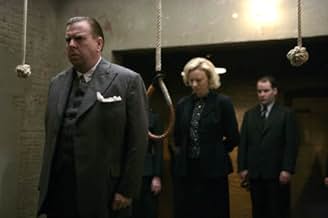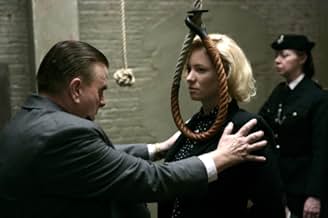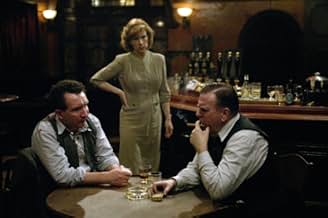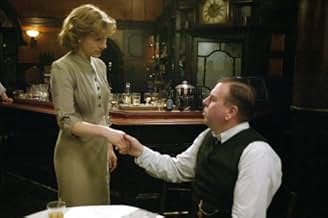VALUTAZIONE IMDb
7,4/10
5803
LA TUA VALUTAZIONE
Aggiungi una trama nella tua linguaThe life and times of Albert Pierrepoint - Britain's most prolific hangman.The life and times of Albert Pierrepoint - Britain's most prolific hangman.The life and times of Albert Pierrepoint - Britain's most prolific hangman.
- Nominato ai 1 BAFTA Award
- 2 vittorie e 4 candidature totali
Lizzie Hopley
- Dorothea Waddingham
- (as Elizabeth Hopley)
Trama
Lo sapevi?
- QuizDespite the title Pierrepoint was not Britain's last hangman. He retired in the mid 1950s, shortly after executing Ruth Ellis. Britain never had a "last hangman", as the last two executions before suspension of capital punishment were carried out in different cities at the same time. The last two people executed were both guilty of the murder of John West, so it was decided to carry out the sentence at the same time in Aug 1964. People were still being sentenced to death In November 1965.
- BlooperWeights of the condemned being expressed in the American way as pounds, rather than the British stones and pounds. Pierrepoint was most meticulous, and would have based all his executions on the UK Home Office table of drops for hanging, which uses British units.
- Citazioni
Albert Pierrepoint: I did a lot of jobs in Germany. More than were really good for me. Too many really. I get so bloody tired now...
- ConnessioniFeatured in Adolf Hitler: The Greatest Story Never Told (2013)
- Colonne sonoreMakin' Whoopee
Music by Walter Donaldson
Lyrics by Gus Kahn
Performed by Timothy Spall and Eddie Marsan
Recensione in evidenza
I saw this DVD twice and read all the other user comments of this recent film before I considered I was ready to write my opinion on IMDb.com.
Capital punishment in the UK was abolished in 1965 and since then it has remained a controversial topic on which MPs have been given a free vote in the House (no whips office involved) and it has consistently been voted down by MPs ever since.The arguments for capital punishment range from "an eye for an eye"; why must the State keep killers alive at the public expense; as an example to other malefactors; to provide revenge for the bereaved families of the murder victim.I suppose the most controversial case cited for reimposing the death penalty stemmed from the Moors Murderers case from 1966, Ian Brady and Myra Hindley who died in custody.Even though they could not judicially be hanged, no Home Secretary since then has considered it politic to release or commute their sentence because of the expected public and media fury.Of course today in Britain killers are routinely sentenced "to life imprisonment" which depending on the circumstances, does not necessarily mean the killer's whole life.
Against this argument is the Christian doctrine of forgiveness and whether the State is executing an innocent man e.g.Timothy Evans (hanged by Pierrepont) instead of John Reginald Halliday Christie for the murder of Evans' baby daughter.
Albert Pierrepoint was certainly not "The Last Hangman" in the UK as I believe he resigned shortly after executing Ruth Ellis in 1955 after a continuous career as Chief hangman stretching from 1933 and as I said above. killers were hanged in the UK right up to 1964.In his 1974 auto- biography he turned against capital punishment with distaste as he considered it was merely the State exacting revenge and solved nothing.Considering he executed 608 murderers we must respect his opinions.I suspect those that advocate execution would not like to do the act personally as long as there is someone else to do it and bear the crushing guilt on their conscience.
Juliet Stevenson gives a marvellously understated performance as Anne Pierrepoint, Albert's wife and provides the home life and comfort to her husband.She is also the business brains in the marriage.We see the chilling, technical efficiency and speed which convinced the Allied powers in 1946 that a British hangman was the best for dispatching the many Nazi war criminals sentenced to death at Nuremburg.Albert was informed by the brigadier that the first batch to be hanged in a day was 13 with many more to come.Albert did not want to know what evil the condemned had done and tried to ensure he kept himself personally and professionally detached when performing his duties for the State.He even had a sense of compassion for the condemned by trying to complete the hanging in less time than his father's average of 13 seconds to reduce the fear and suffering in them.In one notable case he was done in 7 1/2 seconds.Likewise at Nuremburg he decided to hang the condemned female Belsen guards first with the youngest going first as she would be the most frightened.
To my knowledge this is the first film which accurately shows the technical method of hanging that was used in British prisons.It was ignorance by film producers of this that made their films unconvincing when showing a hanging scene as hangmen were advised to keep their methods entirely secret from the public.
All credit must go to Timothy Spall in the central pivotal role and the whole production team in evoking capital punishment in a Britain between 1932- 1955.
Capital punishment in the UK was abolished in 1965 and since then it has remained a controversial topic on which MPs have been given a free vote in the House (no whips office involved) and it has consistently been voted down by MPs ever since.The arguments for capital punishment range from "an eye for an eye"; why must the State keep killers alive at the public expense; as an example to other malefactors; to provide revenge for the bereaved families of the murder victim.I suppose the most controversial case cited for reimposing the death penalty stemmed from the Moors Murderers case from 1966, Ian Brady and Myra Hindley who died in custody.Even though they could not judicially be hanged, no Home Secretary since then has considered it politic to release or commute their sentence because of the expected public and media fury.Of course today in Britain killers are routinely sentenced "to life imprisonment" which depending on the circumstances, does not necessarily mean the killer's whole life.
Against this argument is the Christian doctrine of forgiveness and whether the State is executing an innocent man e.g.Timothy Evans (hanged by Pierrepont) instead of John Reginald Halliday Christie for the murder of Evans' baby daughter.
Albert Pierrepoint was certainly not "The Last Hangman" in the UK as I believe he resigned shortly after executing Ruth Ellis in 1955 after a continuous career as Chief hangman stretching from 1933 and as I said above. killers were hanged in the UK right up to 1964.In his 1974 auto- biography he turned against capital punishment with distaste as he considered it was merely the State exacting revenge and solved nothing.Considering he executed 608 murderers we must respect his opinions.I suspect those that advocate execution would not like to do the act personally as long as there is someone else to do it and bear the crushing guilt on their conscience.
Juliet Stevenson gives a marvellously understated performance as Anne Pierrepoint, Albert's wife and provides the home life and comfort to her husband.She is also the business brains in the marriage.We see the chilling, technical efficiency and speed which convinced the Allied powers in 1946 that a British hangman was the best for dispatching the many Nazi war criminals sentenced to death at Nuremburg.Albert was informed by the brigadier that the first batch to be hanged in a day was 13 with many more to come.Albert did not want to know what evil the condemned had done and tried to ensure he kept himself personally and professionally detached when performing his duties for the State.He even had a sense of compassion for the condemned by trying to complete the hanging in less time than his father's average of 13 seconds to reduce the fear and suffering in them.In one notable case he was done in 7 1/2 seconds.Likewise at Nuremburg he decided to hang the condemned female Belsen guards first with the youngest going first as she would be the most frightened.
To my knowledge this is the first film which accurately shows the technical method of hanging that was used in British prisons.It was ignorance by film producers of this that made their films unconvincing when showing a hanging scene as hangmen were advised to keep their methods entirely secret from the public.
All credit must go to Timothy Spall in the central pivotal role and the whole production team in evoking capital punishment in a Britain between 1932- 1955.
- howardmorley
- 25 set 2006
- Permalink
I più visti
Accedi per valutare e creare un elenco di titoli salvati per ottenere consigli personalizzati
- How long is Pierrepoint: The Last Hangman?Powered by Alexa
Dettagli
- Data di uscita
- Paesi di origine
- Lingua
- Celebre anche come
- Pierrepoint: The Last Hangman
- Luoghi delle riprese
- Aziende produttrici
- Vedi altri crediti dell’azienda su IMDbPro
Botteghino
- Lordo Stati Uniti e Canada
- 23.192 USD
- Fine settimana di apertura Stati Uniti e Canada
- 2.028 USD
- 3 giu 2007
- Lordo in tutto il mondo
- 824.856 USD
- Tempo di esecuzione1 ora 30 minuti
- Colore
- Mix di suoni
- Proporzioni
- 1.85 : 1
Contribuisci a questa pagina
Suggerisci una modifica o aggiungi i contenuti mancanti

Divario superiore
By what name was The Last Hangman (2005) officially released in Canada in English?
Rispondi

































